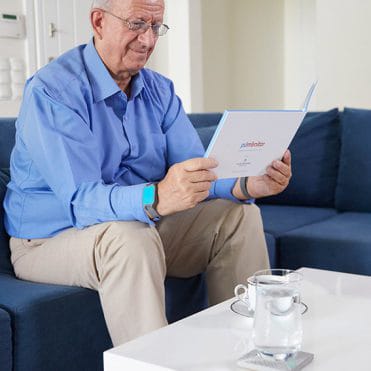Breakthrough remote monitoring tech for Parkinson’s could be approved for NHS use in 2023

The National Institute for Health and Care Excellence (NICE) is currently evaluating PDMonitor, a continuous monitoring system for people with Parkinson’s disease created by medical device company PD Neurotechnology, for use on the NHS.
PD Neurotechnology will submit information to NICE ahead of its committee meeting on 31 August when devices for remote continuous monitoring of people with Parkinson’s will be discussed. PDMonitor is one of four medical devices currently undergoing evaluation by NICE as part of its Diagnostic Assessment Programme.
PDMonitor uses medical-grade wearable technology to track Parkinson’s motor symptoms automatically and continuously. It enables physicians to tailor treatment plans based on a stream of objective data showing how patients experience symptoms in their day-to-day lives.
Nikos Moschos, Founder of PD Neurotechnology, said: “Today, most Parkinson’s treatment is informed by subjective patient diaries reviewed by physicians once or twice a year. We’ve changed the game by providing physicians with a stream of objective data showing disease progression in the real world.
“Our transformative, medical-grade technology offers continuous monitoring, full symptom coverage and a holistic view of the patient. The majority of patients feel their health and quality of life stabilised or improved after using PDMonitor. This is data and AI at its finest.”
More than 150 physicians have already been trained to use PDMonitor. The assistive technology is currently used in private or hospital practice by physicians and patients in the UK, France, Austria, Germany, Italy, Spain, Sweden, Ireland, Greece, and Cyprus.
Preliminary feedback from Parkinson’s patients that have monitored their symptoms for up to two years with PDMonitor indicates that most feel their condition stabilised (43 percent) or improved (35 percent) after starting to use the technology. Clinical trials in Germany, Italy, and Greece have recorded “very high” reliability and specificity levels, and symptom detection accuracy of up to 93 percent.
Professor Ray Chaudhuri, Head of Parkinson’s Research at King’s College Hospital, who has been piloting PDMonitor with private patients since March 2022, commented: “Parkinson’s is the world’s second most common neurodegenerative disease and a significant cause of disability. Patients’ quality of life and disease progression strongly depend on the consistent, prompt staging of the disease and optimal timing and dosing of the prescribed therapy.
“PDMonitor is supporting a paradigm shift in Parkinson’s care by improving the quality and timeliness of information physicians have to assess the disease. Monitoring patients at home, continuously while they conduct everyday activities, allows treatment decisions to be made more frequently and physicians to respond faster to changing symptoms.
“While you cannot reverse Parkinson’s, you can delay the deterioration of symptoms and possibly decrease the risk of falling. Optimising care means the disease progresses slower in time and the therapeutic window is kept open.”
Earlier this year, NICE announced that it is working on a collaborative technology lab to develop solutions to complex health assessment problems.
Using collaborative and innovative approaches, the Health Technology Assessment innovation Laboratory (HTA Lab) will enable NICE to work with its stakeholders to develop solutions to complex HTA issues. This includes disruptive new health technologies and broader methods, process and policy issues, which will help drive solutions to current and future health challenges – taking innovation from the lab and into practice.

